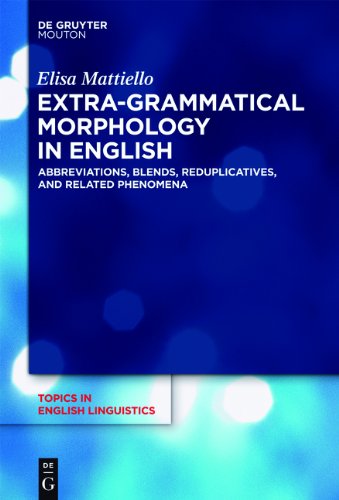

Most ebook files are in PDF format, so you can easily read them using various software such as Foxit Reader or directly on the Google Chrome browser.
Some ebook files are released by publishers in other formats such as .awz, .mobi, .epub, .fb2, etc. You may need to install specific software to read these formats on mobile/PC, such as Calibre.
Please read the tutorial at this link. https://ebooknice.com/page/post?id=faq
We offer FREE conversion to the popular formats you request; however, this may take some time. Therefore, right after payment, please email us, and we will try to provide the service as quickly as possible.
For some exceptional file formats or broken links (if any), please refrain from opening any disputes. Instead, email us first, and we will try to assist within a maximum of 6 hours.
EbookNice Team

Status:
Available4.5
31 reviews
ISBN 10: 3110293862
ISBN 13: 9783110293869
Author: Elisa Mattiello
Extra-grammatical morphology is a hitherto neglected area of research, highly marginalised because of its irregularity and unpredictability. Yet many neologisms in English are formed by means of extra-grammatical mechanisms, such as abbreviation, blending and reduplication, which therefore deserve both greater attention and more systematic study. This book analyses such phenomena.
1. Introduction
1.1. Data
1.1.1. Lexical status of items
1.2. Key references
1.3. Organisation of the work
2. The theoretical framework
2.1. Extra-grammatical formations in Generative Morphology
2.2. Extra-grammatical formations in Naturalness Theory
2.2.1. Natural Morphology
2.2.2. Natural Phonology
2.3. Extra-grammatical morphology
2.3.1. Extra-grammatical vs. expressive morphology
2.3.2. Extra-grammatical vs. marginal morphology
2.3.3. Extra-grammatical vs. grammatical morphology
2.3.4. Grammatically and regularity of extra-grammatical morphology
2.3.5. Extra-grammaticality and language change
2.3.6. Fundamental notions
2.3.7. Definition and properties of extra-grammatical morphology
3. Abbreviations
3.1. Definition, delimitation, and classification
3.1.1. Definition of clipping
3.1.2. Delimitation: Clipping vs. other processes
3.1.3. Classification and structure of clippings
3.1.4. Definition of acronyms and initialisms
3.1.5. Delimitation: Acronyms and initialisms vs. other processes
3.1.6. Classification of acronyms and initialisms
3.1.7. Acronyms and initialisms: Further remarks
3.2. Abbreviations as extra-grammatical phenomena
3.2.1. Irregularities in abbreviations
3.2.2. Regularities in abbreviations
3.2.3. Predictability in abbreviations
3.2.4. Criteria of well-formedness
4. Blends
4.1. Definition, delimitation, and classification
4.1.1. Definition and main features
4.1.2. Delimitation: Blending vs. other processes
4.1.3. Classification and structure of blends
4.1.4. Blends: Further remarks
4.2. Blending as an extra-grammatical phenomenon
4.2.1. Irregularities in blends
4.2.2. Regularities in blends
4.2.3. Predictability in blends
4.2.4. Criteria of well-formedness
5. Reduplicatives
5.1. Definition, delimitation, and classification
5.1.1. Definition
5.1.2. Delimitation: Reduplication vs. other processes
5.1.3. Classification and structure of reduplicatives
5.2. Reduplication as an extra-grammatical phenomenon
5.2.1. Irregularities in reduplicatives
5.2.2. Regularities in reduplicatives
5.2.3. Predictability in reduplicatives
5.2.4. Criteria of well-formedness
6. Minor phenomena
6.1. Back-formation: Definition, delimitation, and classification
6.1.1. Definition
6.1.2. Delimitation: Back-formation vs. other processes
6.1.3. Classification and structure of back-formed words
6.2. Back-formation as an extra-grammatical phenomenon
6.2.1. Irregularities in back-formation
6.2.2. Regularities in back-formation
6.2.3. Predictability in back-formation
6.2.4. Criteria of well-formedness
6.3. Infixation: Definition, delimitation, and classification
6.3.1. Definition
6.3.2. Delimitation: Infixation vs. other processes
6.3.3. Classification of infixes
6.4. Infixation as an extra-grammatical phenomenon
6.4.1. Irregularities in infixation
6.4.2. Regularities in infixation
6.4.3. Predictability in infixation
6.4.4. Criteria of well-formedness
6.5. Phonaesthemes: Definition, delimitation, and classification
6.5.1. Definition
6.5.2. Delimitation: Phonaesthemes vs. other morpho(no)logical concepts
6.5.3. Classification of phonaesthemes
6.6. Phonaesthemes as an extra-grammatical phenomenon
6.6.1. Irregularities in phonaesthemes
6.6.2. Criteria for identification
7. Extra-grammatical formations in use
7.1. Principles of contextual suitability
7.2. Typical contexts and domains
7.3. Contextualising extra-grammatical phenomena
7.3.1. Clippings
7.3.2. Acronyms and initialisms
7.3.3. Blends
7.3.4. Reduplicatives
7.3.5. Back-formation, infixation, and phonaesthemes
8. Conclusions
Notes
References
Sources for data
Lexical index
Subject index
extragrammatical morphology
morphology books
morphology workbook pdf
morphology ebook
extra-grammatical
morphology of biblical greek pdf
Tags: Elisa Mattiello, grammatical, Morphology